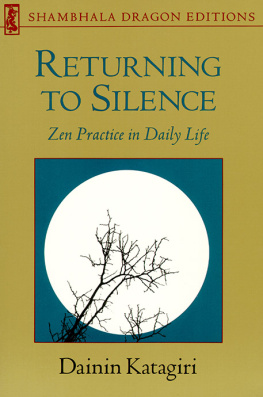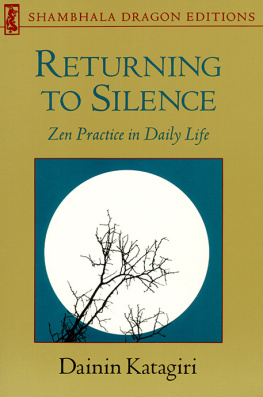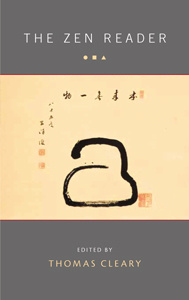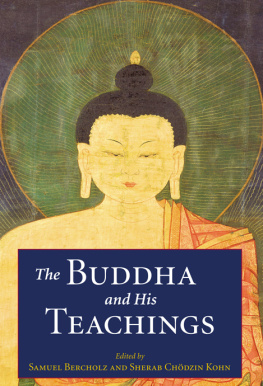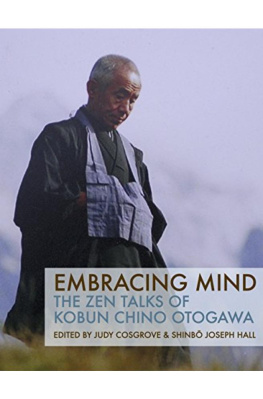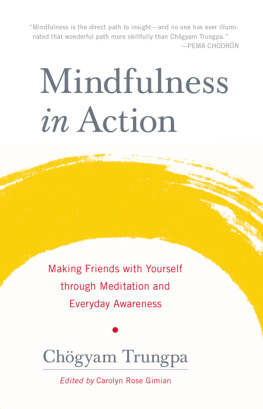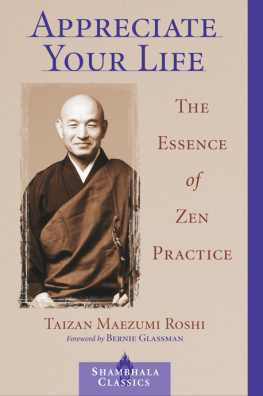Sign up to receive news and special offers from Shambhala Publications.

Or visit us online to sign up at shambhala.com/eshambhala.
RETURNINGTOSILENCE
Zen Practice in Daily Life
Dainin Katagiri
EDITED BY
YK CONNIFF & WILLA HATHAWAY

SHAMBHALA
Boulder
2017
SHAMBHALA PUBLICATIONS, INC.
4720 WALNUT STREET
BOULDER, COLORADO 80301
www.shambhala.com
1988 by Minnesota Zen Meditation Center
All rights reserved. No part of this book may be reproduced in any form or by any means, electronic or mechanical, including photocopying, recording, or by any information storage and retrieval system, without permission in writing from the publisher.
Library of Congress Cataloging-in-Publication Data
Katagiri, Dainin, 1928
Returning to silence.
Bibliography: p.
I. Religious lifeZen Buddhism. 2. Stsh
Doctrines. I. Conniff, Yk. II. Hathaway, Willa.
III. Title.
BQ9286.K37 1988 294.34448 87-28844
eISBN 9780834841000
ISBN 9780877734314 (pbk.)
The quotation on pp. 6970 is from Irving Babbit, trans. The Dhammapada. Copyright 1936 by Edward S. Babbit and Esther B. Howe, reprinted by permission of New Directions Publishing Corporation.
TO MY MASTERS:
Honshi: Kaigai Daich, Daiosh
Sangakushi: Rend Ek, Daiosh
D AININ KATAGIRI ROSHI returns to silence, and he speaks. He is one of Americas great Zen masters, and he dares to begin his beautiful work, When we think...
Katagiri Roshi is my friend. He likes me. I like him. We look at each other and feel rested, each seeing how tired the other is, sharing determination. We must always try to accept all sentient beings as the contents of our life.
When I am with Katagiri, I feel as I used to when I was with my late Dharma father, great Geshe Wangyal (whom I mention for a purpose, for the sake of fullness, to hold nothing back), and as I do when I am with some lama friends. Cheerful and content, but a bit on edge, as if many more people were there with us.
When I am with His Holiness the Dalai Lama, I feel as if at least the six million Tibetans were with us in the room, and around them inconceivable multitudes of feeling beings. When I am with Katagiri Roshi, I feel the hundreds of millions of Japannot just Japan of this moment, but Japan as it has grown over a millennium. The people of Bashos green leaf floating, the delicate people teeming on the broad green leaf in the bright sun of Vairocanas mirror of form.
And woven between us all are so many peoples in between, especially peoples of the snowy northlandsYakut, Buryat, Inuit, Tlingit, down to the earthy Winnebago and Ojibwa of Katagiris Minnesota woods. All sentient beings. All feeling beings. Feelings are inconceivable.
I am honored to introduce Katagiris deep and beautiful shakuhachi speech. It took me too long to read it. I still have not read every word. It is not a book to get through. It is a book to live in. Many books are read in pausing from life, when you take some time off, when you escape, put everything on hold. This book is such; when you live in it you are more outside it, more in life. Read it a little and keep it near your places. Let it be a friend. Let it help you to keep the trivia in perspective.
From the very beginning, the book corners you. Katagiri Roshi plainly tells us: The opportunity to experience real silence occurs when we have been driven into a corner and simply cannot move an inch. And he advises wisely that it only takes transcending desire to turn despair at being cornered into real silence, Buddha silence, the total manifestation of our whole personality.
What a book. What a great gift. To open to us our corner. To show us how being absolutely trapped is the total freedom of being with all beings. Katagiri Roshi can do this because he speaks without budging from such a corner, he speaks in the totality of such silence. He and the corner and his words and the silence are among the dimensions of the book. Its cover opens and its inconceivability is accessed in our eye and brain and heart, and our mind and the book and Katagiri Roshi and boundless crying and laughing Buddhas are all together in the bliss dimensions.
Of course, not one specific detail is obliterated. The bliss dimension is undiluted clarity and exquisite sensitivity. We are gripped when we share that dimension with an American pilot of the great Pacific War, parachuting into Japan and injuring himself. We become the Japanese medic Senri Uyeno who sought to help him, against orders, but ultimately was falsely accused of killing him, and was executed for this deed he did not commit. We become the poem he wrote before his death. When he says... putting myself in anothers place without flinching, no matter how hard and heart rending it is to live, we are gratefully cornered.
Lets find happiness by ourselves. / Within silver tears like pearls and laughter as the sun, / lets keep walking ahead each day. Katagiri Roshi is generous, too; he lets us all be with this awesome poet, find this stunning poetry in the mouth of a supposed war criminal of the grisly past. A man whose death was a wound between us, America and Japan. Even on the outermost level of this completeness, there is a shining resurrection from that death.
While it could be ordered any way, every word and phrase in the jewel dimension, the book is artfully arranged. It begins at the ultimate end, the truth body dharmakaya of Buddha silence where we all connect with Katagiri Roshi. It calls that first section daily life, and we live a rich daily life together for a hundred pages.
Katagiris description of supreme knowledge meets the realm of peerless Shantideva; with supreme knowledge we can see one beautiful picture where two things are constantly interchanging. This is the place in which we have to stand up.... I cannot survive without all of you. I can help because others are not other; others are the contents of my life, others are completely embraced by my life, my life can be found with others lives. At that time I can do something with full commitment.... And he connects it with the sublime earthiness of the matchless Dogen. We can help in many ways. Using toilet paper carefully is helping others. Dont expect helping to be a big deal. In our everyday life, we can help someone or something all the time.
Katagiri makes his biggest statement when he unfurls Dogen Zenjis banner of zazen, the sitting-as-Buddha that is the goal of all Buddhism, the goal of all life, the true entrance, foundation and ultimate goal of all religion. He initiates us in Dogens seamless monument mandala of perfect religious securityjust sitting zen is eternal peak experience, the realm of end-in-itself. Katagiri Roshi offers it to us all, whether we be Buddhist or Christian or Jew, atheist or hedonist. Zazen penetrates and is available to all circles of human life: skiing, basketball, dancing, whatever you do.... This is basic universal practice, because we create life anew, day after day. This is the peak of the book as well. This is where we are allowed to sit when we read it. This reminds us there is nothing more important. It reminds us it is not only a just sitting, it is an exclusive sitting, an initiated, sacred sitting that excludes all egotistic ordinariness of means and ends, a sitting that is just, that is exact, exactly balancing absolute and relative, exactly here and everywhere, that is total, totally embracing life and death, sterility and fertility, good and evil, love and hate, and all ordinary opposites in harmony.
Next page
